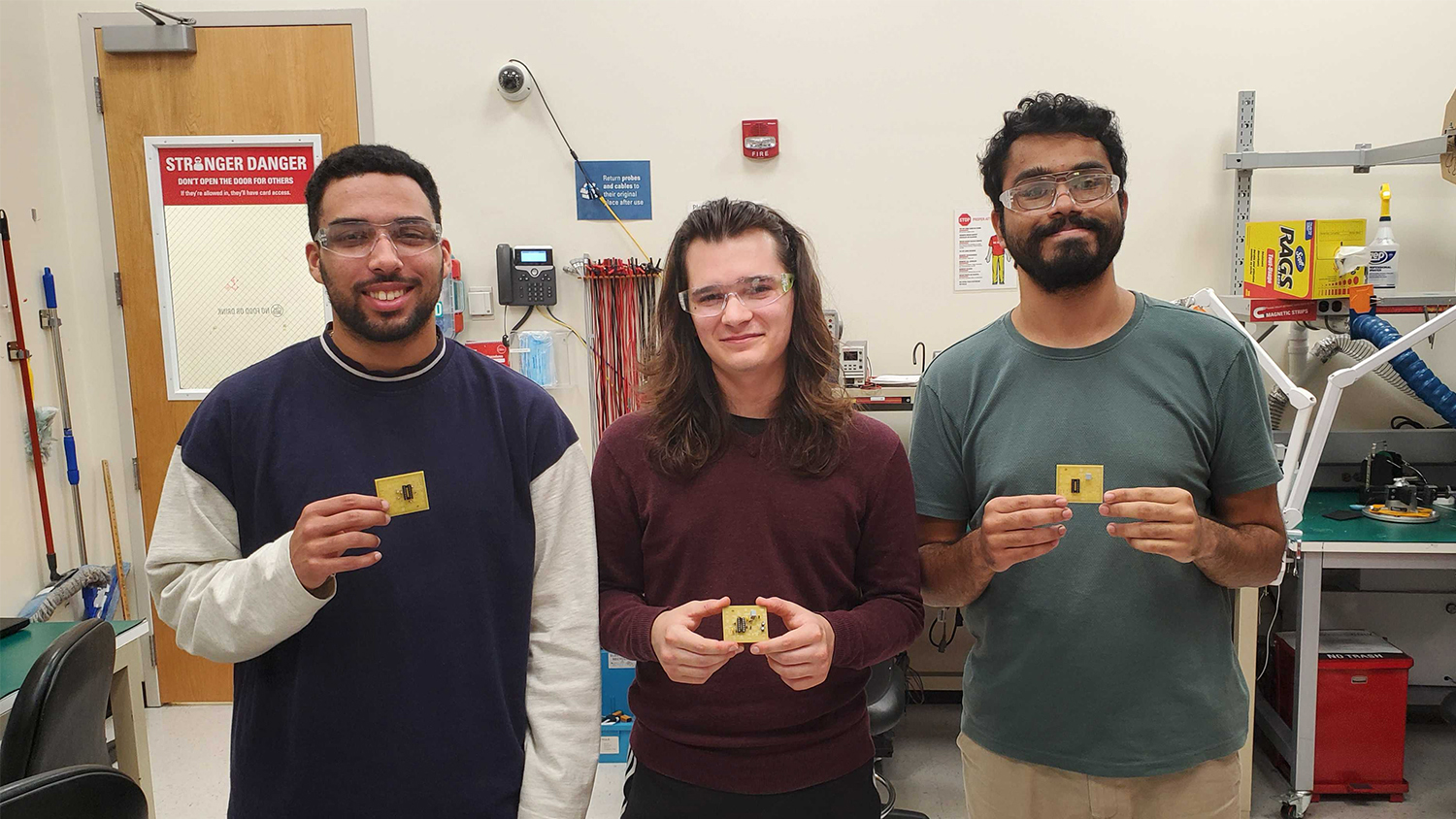Future Students

Welcome to the Department of Materials Science and Engineering (MSE) at NC State!
Our program is designed for students eager to explore the exciting world of materials and their applications in modern technology. We invite you to discover how an MSE degree can open doors to innovative careers and make a meaningful impact on the world.
Why Choose MSE at NC State?
- Interdisciplinary Focus: Our program integrates principles from various fields, including engineering, math, chemistry, and physics, preparing you for diverse career opportunities.
- High-Impact Research Opportunities: Engage in cutting-edge research alongside world-renowned faculty. Our undergraduate students often participate in research projects that address real-world challenges, from renewable energy solutions to advanced materials for biomedical applications. See our faculty’s research areas.
- Hands-On Learning: Benefit from small class sizes and personalized attention in hands-on laboratory courses, where you’ll gain practical skills using state-of-the-art equipment.
- Industry-Relevant Curriculum: Our curriculum covers the latest advancements in materials science, including nanotechnology, biomaterials, and computer modeling. You’ll be well-prepared to tackle industry challenges. View the MSE curriculum options.
Admission Information
Application for admission to NC State is handled at the university level.

I’m a High School Student
To apply, submit your application to the College of Engineering First Year Program and select MSE as your intended major. After completing the standard first-year engineering courses, you can apply to join MSE as a degree-seeking student through the Change of Degree Application (CODA) process.
NC State Admissions
I’m a Transfer Student
If you’re interested in transferring to the MSE Department from another institution, apply directly to NC State Undergraduate Admissions. For additional information and deadlines, please visit the Undergraduate Admissions website for transfer students.
Transfer Admissions
Visit Us. Learn More.
The College of Engineering provides information for future engineering students and invites you to visit the college or take a campus tour.
Student Experience
At NC State, we believe that your educational experience goes beyond the classroom, especially in the Materials Science and Engineering (MSE) program. Here’s what you can expect:
- Research Opportunities: Over 65% of our undergraduate students engage in hands-on research alongside faculty mentors, participating in impactful projects that shape the future of materials science.
- Student Organizations: Join professional societies such as Material Advantage to network with peers, attend industry workshops, and build your professional network.
- Personalized Support: Our dedicated professional academic advisor will help you navigate your academic journey and plan for your future.
- Collaborative Environment: NC State’s MSE Department fosters a close-knit community focusing on collaboration and innovation. Our small class sizes allow you to get to know your classmates and professors personally.
- Study Abroad Opportunities: Enhance your global perspective by participating in short-term or semester-long study abroad programs, gaining valuable international experience in materials science.
“I love how small the department is—everyone knows each other, the events are fun and creative, and the advisor is one of the most helpful at NC State. Getting into a lab was very accessible because MSE is so tightly knit, and working with Dr. Martin Thuo on rare-earth lanthanide coordination polymers gave me invaluable lab experience and professional connections. It also exposed me to polymer science and shaped my expectations for the future.”
– Shawn, Class of 2025




Career Prospects
Earning a Bachelor of Science in MSE offers graduates a wealth of exciting career opportunities across diverse industries. The interdisciplinary nature of an MSE education prepares individuals to work in roles that involve designing, developing, and optimizing materials that drive innovation and address societal needs. Here’s what you can expect:
Common Industries
- Materials Science: Innovate and optimize materials such as semiconductors, metals, steel, plastics, ceramics, and composites for a wide range of applications.
- Electronics and Semiconductors: Create advanced materials for microchips, sensors, and electronic components.
- Aerospace: Develop lightweight, durable materials for aircraft and spacecraft.
- Energy: Advanced materials for renewable energy technologies, batteries, and energy storage systems.
- Sustainability: Develop sustainable materials and processes to reduce environmental impact.
- Biomedical: Design biomaterials for prosthetics, medical devices, and tissue engineering.
- Automotive: Innovate materials for improved fuel efficiency, durability, and safety.
- Pharmaceuticals & Healthcare: Design and improve materials used in drug delivery systems and medical implants.
- Environmental Engineering: Design materials for air and water purification, carbon capture, and environmental cleanup.
- Consumer Goods: Improve products like durable coatings, cosmetics, and high-performance clothing with nanomaterials.
- Regenerative Medicine: Create materials for applications in stem cell therapy and wound healing.
- Diagnostics: Design biosensors and diagnostic devices that utilize biomaterials for medical testing and monitoring.
Career Roles and Opportunities
Materials science and engineering is a dynamic field, offering professionals opportunities to solve complex challenges and make meaningful contributions to society. A career in MSE offers a diverse range of opportunities:
- Ceramics Engineer: Designing and testing ceramic materials for applications in aerospace, electronics, and healthcare.
- Composite Engineer: Designing and analyzing composite materials for lightweight and durable structures.
- Consulting Engineer: Providing technical expertise to solve engineering challenges across industries.
- Corrosion Engineer: Analyzing material degradation and developing corrosion-resistant materials and coatings.
- Data Engineer: Designing, developing, and optimizing data pipelines and workflows for materials-related data.
- Defectivity Design Engineer: Minimizing defects in materials or manufacturing processes and implementing corrective actions.
- Design Engineer: Creating and optimizing product designs using CAD and simulation tools.
- Engineering Technician: Assisting engineers in testing, developing, and manufacturing materials or products.
- Failure Analysis Engineer: Investigating material or product failures to determine root causes and enhance reliability.
- Field Applications Scientist: Supporting customers in implementing scientific tools or materials in applications.
- Manufacturing Engineer: Developing and optimizing manufacturing processes for material production.
- Materials Engineer: Designing, testing, and analyzing materials for various applications.
- Materials Scientist: Conducting research to understand material properties and developing innovative materials.
- Metallurgical Engineer: Developing processes for extracting, refining, and processing metals and alloys.
- Packaging Engineer: Designing and testing innovative packaging solutions for products.
- Patent Examiner: Reviewing patent applications for originality and compliance in materials-related innovations.
- Plastics Engineer: Developing and optimizing polymer and plastic materials for industrial applications.
- Polymer Materials Engineer: Researching and developing advanced polymer materials for diverse applications.
- Pre-Sales Engineer: Providing technical expertise to support sales teams in material-related products.
- Principal Scientist: Leading R&D initiatives in materials science and mentoring junior researchers.
- Process Engineer: Developing and improving manufacturing processes for materials production.
- Product Designer: Creating innovative product designs using advanced materials.
- Product Engineer: Overseeing the development, testing, and manufacturing of products.
- Project Manager: Planning and overseeing material development projects and coordinating teams.
- Quality Engineer: Developing and implementing quality assurance processes to ensure material compliance.
- Quality Control Engineer: Testing materials and products to ensure quality and performance standards are met.
- Renewable Energy Materials Engineer: Developing materials for renewable energy technologies like solar panels and batteries.
- R&D Engineer: Leading research projects to develop innovative materials and technologies.
- Sales Engineer: Providing technical support for the sale of material-related products and solutions.
- Semiconductor Processing Engineer: Developing and optimizing processes for semiconductor fabrication.
- Systems Engineer: Designing and integrating systems for material-related projects and optimizing performance.
What can I do with a Nanomaterials Concentration?
A concentration in nanomaterials within MSE offers exciting career opportunities in cutting-edge fields where material properties at the nanoscale are leveraged to revolutionize industries. Nanomaterials professionals are equipped with the expertise to design, characterize, and optimize materials with unique properties like high strength, lightweight, improved electrical conductivity, and enhanced reactivity, making them invaluable in various applications. Whether you aim to pursue a career in research, product development, or environmental sustainability, a concentration in Nanomaterials provides a strong foundation for growth.
Nanomaterials Career Roles & Opportunities
- Nanomaterials Scientist: Conducting research and development of new nanomaterials for specific applications.
- Nanotechnology Engineer: Designing and fabricating nanoscale devices and systems.
- Quality Assurance Specialist: Ensuring nanoscale products meet rigorous safety and performance standards.
- Sustainability Specialist: Developing nanomaterials for eco-friendly and sustainable solutions
What can I do with a Biomaterials Concentration?
A concentration in biomaterials within MSE equips graduates with the knowledge and skills to design, develop, and apply materials in medical and biological contexts. Biomaterials are at the forefront of innovation in healthcare, enabling advances in medical devices, regenerative medicine, drug delivery, and diagnostics. This interdisciplinary field combines principles of materials science, biology, and engineering, offering graduates opportunities to make significant contributions to improving human health and well-being.
Biomaterials Career Roles & Opportunities
- Biomaterials Scientist: Conducting research to develop advanced biomaterials for medical applications.
- Biomaterial Engineer: Developing and designing materials for medical devices, implants, and drug delivery systems.
- R&D Engineer/Scientist: Innovating biomaterials for drug delivery, diagnostics, and biotechnology.
- Regulatory Affairs Specialist: Ensuring biomaterials and devices meet regulatory standards and compliance.
- Clinical Research Scientist: Evaluating the performance and safety of biomaterial-based products.
Career Planning Support
NC State provides a wealth of resources to help you plan for a successful career with a degree in Materials Science and Engineering. From professional development workshops to networking opportunities, we are committed to your career success.
Material Advantage Student Chapter Workshops
Gain access to professional development workshops through the Material Advantage Student Chapter, covering resume building, LinkedIn optimization, and interview techniques to boost your job search skills.
Career Development Center Resources
The NC State Career Development Center provides valuable support throughout your career journey:
- Workshops: Participate in in-person sessions on resume writing, LinkedIn profiles, interview preparation, and job search strategies.
- Drop-In Hours: Available on Centennial Campus specifically for engineering students.
- One-on-One Appointments: Schedule personalized career advising.
- Job & Internship Opportunities: Access engineering-specific job and internship listings.

MSE Senior Spotlights
Read about the journeys of real students
Join Us at NC State!
Are you ready to start your journey with us? The MSE program at NC State is your gateway to a future in engineering and innovation.